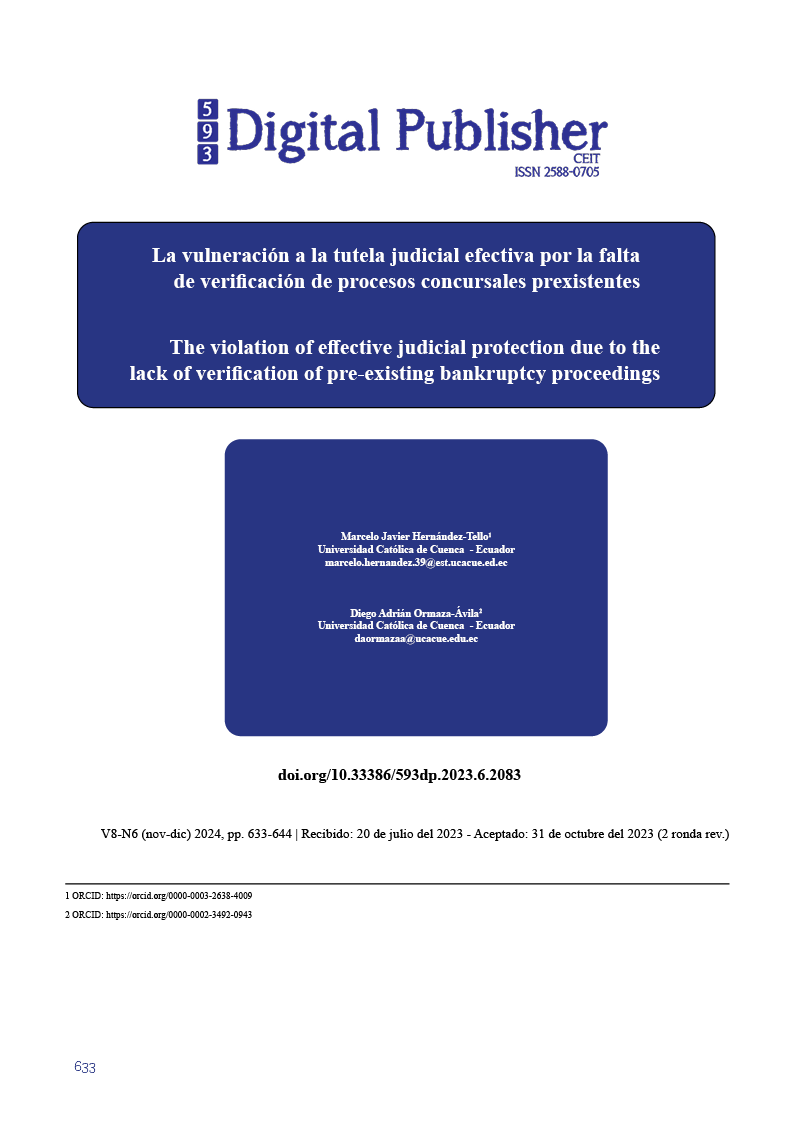The violation of effective judicial protection due to the lack of verification of pre-existing bankruptcy proceedings
Main Article Content
Abstract
In this article, the violation of effective judicial protection generated by the lack of verification of the existence of other bankruptcy proceedings with respect to the same debtor was studied, ignoring the provisions of number 7 of Art. 423 of the General Organic Code of Processes, producing the coexistence of several trials by necessary competition with respect to an identical defendant. Through a synthetic analytical work, information has been reviewed and collected from the study of 40 bankruptcy proceedings, always supported by the theoretical foundation of scientific articles referring to bankruptcy, effective judicial protection and due process. The results obtained indicated the coexistence of bankruptcy proceedings initiated against the same debtor, which contravenes the legal regulations affecting effective judicial protection. Additionally, it was found that in the vast majority of cases, there has been no search within the databases of the computer system of the Judicial Function, nor any other type of reason or proof that the existence or not from other bankruptcy proceedings.
Downloads
Article Details

This work is licensed under a Creative Commons Attribution-NonCommercial-ShareAlike 4.0 International License.
1. Derechos de autor
Las obras que se publican en 593 Digital Publisher CEIT están sujetas a los siguientes términos:
1.1. 593 Digital Publisher CEIT, conserva los derechos patrimoniales (copyright) de las obras publicadas, favorece y permite la reutilización de las mismas bajo la licencia Licencia Creative Commons 4.0 de Reconocimiento-NoComercial-CompartirIgual 4.0, por lo cual se pueden copiar, usar, difundir, transmitir y exponer públicamente, siempre que:
1.1.a. Se cite la autoría y fuente original de su publicación (revista, editorial, URL).
1.1.b. No se usen para fines comerciales u onerosos.
1.1.c. Se mencione la existencia y especificaciones de esta licencia de uso.
References
Agudelo, M. (2005). El debido proceso. Opinión jurídica Vol. 4, No. 7, Pág. 89 – 105.
https://revistas.udem.edu.co/index.php/opinion/article/view/1307
Aguirre, V. (2010). El derecho a la tutela judicial efectiva: una aproximación a su aplicación por los tribunales ecuatorianos. FORO, 5 – 43. http://hdl.handle.net/10644/2976
Aguirre, V. La tutela judicial efectiva como derecho humano: una aproximación a su concepción y situación en el Ecuador. En: ¿Estado constitucional de derechos?: informe sobre derechos humanos Ecuador 2009. Quito: Universidad Andina Simón Bolívar. Sede Ecuador. Programa Andino de Derechos Humanos, PADH; Abya Yala. pp. 13-35. https://repositorio.uasb.edu.ec/bitstream/10644/925/1/Art.1-Aguirre-La%20tutela%20judicial.pdf
Álvarez, H. (2014). EL DERECHO A LA TUTELA JUDICIAL EFECTIVA DESDE LA PERSPECTIVA DEL DERECHO CIVIL: SUPUESTOS MÁS RELEVANTES 1. Revista Europeas de Derechos Fundamentales - primer semestre 2014:23, 27-51
El derecho a la tutela judicial efectiva desde la perspectiva del derecho civil: supuestos más relevantes - Dialnet (unirioja.es)
Asamblea Nacional. (4 del 3 de 2009). Código Orgánico de la Función Judicial, Quito Ecuador.
Asamblea Nacional Constituyente. (20 de 10 de 2008). Constitución de la República del Ecuador, Monte Cristi, Ecuador.
Asamblea Nacional (12 del 05 de 2015). Código Orgánico General de Procesos, Quito Ecuador.
Castillo (2013). DEBIDO PROCESO Y TUTELA JURISDICCIONAL. Repositorio Institucional Pihura, 1-10
Castro, R, (2021). Debido proceso en Ecuador. DerechoEcuador.com.
https://derechoecuador.com/debido-proceso-en-ecuador/
Cevallos Sánchez, G. & Alvarado Moncada, Z. (2018). Tutela Judicial efectiva y la relación con el principio de inmediación. Universidad y Sociedad, 10(1), 168-173. Recuperado http://rus.ucf.edu.cu/index.php/rus Tutela judicial efectiva y la relación con el principio de inmediación (sld.cu)
Corte Constitucional del Ecuador. Sentencia No. 889-20-JP/21
Echandía, H. (1997). TEORIA GENERAL DEL PROCESO. Tercera edición, pág. 141
teoria-general-del-proceso-devis-echandia.pdf (wordpress.com)
García, G. Contreras, P. (2013). El derecho a la tutela judicial y al debido proceso en la jurisprudencia del tribunal constitucional chileno. Estudios Constitucionales, Vol. 11, num. 2, Pág. 229 – 281. EL DERECHO A LA TUTELA JUDICIAL Y AL DEBIDO PROCESO EN LA JURISPRUDENCIA DEL TRIBUNAL CONSTITUCIONAL CHILENO (scielo.cl)
Grijalva, A. (2011). Constitucionalismo en el Ecuador. Centro de estudios y difusión del derecho Constitucional, 1 – 290 Constitucionalismo en Ecuador - ProQuest
Hernández, F. (2018). El concurso mercantil: ¿Sigue siendo un juicio universal? Biblioteca jurídica virtual del Instituto de Investigaciones Jurídicas de la UNAM, 203 – 224 https://doi.org/10.22201/iij.24487902e.2018.14.13372
Hernández, R. Guarderas, R. (2021). Concurso de acreedores por incumplimiento de
obligaciones. REVISTA FACULTAD DE JURISPRUDENCIA PONTIFICIA
UNIVERSIDAD CATÓLICA DEL ECUADOR. No. 9, 2021, pp. 93-117, ISSN:
Jara, M. (2017). Tutela arbitral efectiva en Ecuador. Corporación de estudios y publicaciones Quito, 1 – 349. http://hdl.handle.net/10644/7088
La acción de la Corte Constitucional en diferentes etapas frente a la tutela judicial efectiva, (2020). CEDEC Corte Constitucional del Ecuador. [video]. YouTube. https://www.youtube.com/watch?v=pFFHSs1I3s0
López, H. (2016). El debido proceso y el derecho penal. Revista Contribuciones
a las Ciencias Sociales, (abril-junio 2016). En línea: http://www.eumed.net/rev/cccss/2016/02/proceso.html
Primera Sala de la Ex Corte Suprema de Justicia (2004). Resolución No. 69-2004.

